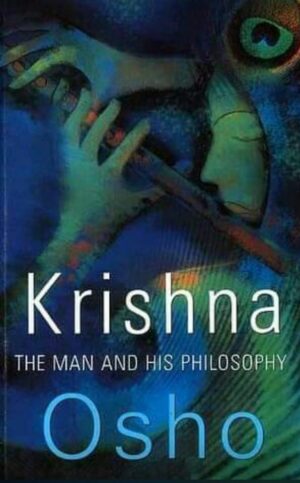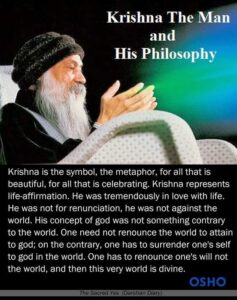
Krishna is not a seeker. It would be wrong to call him a seeker. He is a siddha, an adept, an accomplished performer of all life’s arts. And what he says in this siddha state, in this ultimate state of mind, may seem to you to be egoistic, but it is not. The difficulty is that Krishna has to use the same linguistic “I” as you do, but there is a tremendous difference in connotation between his “I” and yours.
Different Meaning of ‘I’
When you say “I” it means the one imprisoned inside your body, but when Krishna says it he means that which permeates the whole cosmos. Hence he has the courage to tell Arjuna, “Give up everything else and come to my feet.” If it were the same “I” as yours – a prisoner of the body – it would be impossible for him to say a thing like this. And Arjuna would have been hurt if Krishna’s “I” were as petty as yours. Arjuna would have immediately retorted, “What are you saying? Why on earth should I surrender to you?” Arjuna would have really been hurt, but he was not.
The Book KRISHNA, the Man and His Philosophy has become rare. It can be ordered via internet
Krishna Dances with the whole Universe
Krishna, like Kamal, is engrossed in a dance, the cosmic dance. Kabir’s son dances with a few plants in a small forest, but Krishna dances with the whole universe: he dances with its stars, with its men and women, with its trees and flowers and even its thistles. And he is so one with the cosmic dance there is no way for “I” and “thou” to exist in that space. The state of egolessness Krishna achieves in this moment of dance is the same that Buddha and Mahavira achieve at the end of a long and arduous journey, a journey of hard work, austerity and asceticism. Where Krishna begins his journey, after completing a marathon race Mahavira and Buddha arrive.
Krishna de Mens en zijn Filosofie
Krishna is het symbool en staat voor alles wat mooi is, voor alles wat in viering verkeert. Hij hield ontzettend veel van het leven. Hij was tegen afstand doen van dingen, hij was niet tegen de wereld. Het is niet nodig om zich van de wereld af te wenden om het goddelijke te bereiken.
Krishna is geen zoeker. Het zou verkeerd zijn hem een zoeker te noemen. Hij is een siddha, een bedreven, een bekwaam beoefenaar van alle levenskunsten. En wat hij zegt in deze siddha-staat, in deze ultieme gemoedstoestand, lijkt misschien egoïstisch, maar dat is het niet. Het probleem is dat Krishna hetzelfde taalkundige ‘ik’ moet gebruiken als jij, maar er is een enorm verschil in connotatie tussen zijn ‘ik’ en die van jou.
Krishna is absolute Vrij van Egoïsme
Egoloosheid vindt ook plaats bij Boeddha en Mahavira, maar het komt tot hen na lange, harde strijd en zwoegen. Het komt echter misschien niet bij de meeste van hun volgers, omdat het op hun pad het allerlaatste is dat komt. Dus de volgelingen komen er misschien wel of niet. Maar egoloosheid staat voorop bij Krishna; hij begint waar Boeddha en Mahavira eindigen. Dus iemand die ervoor kiest om met Krishna mee te gaan, moet dit bij het begin hebben. Als hij faalt, is er geen sprake van dat hij samen met Krishna gaat.

Whenever someone speaks to another in the language of the ego, it creates an instant reaction in the ego of the other. When you say something in the words of the “I” of the ego, the other immediately begins to speak the same language. We are skilled in knowing the undertones of each other’s words, and we react sharply.
KRISHNA’S ‘I’ is absolutely Free of Egoism
But Krishna’s “I” is absolutely free of all traces of egoism, and for this reason he could call upon Arjuna to make a clean surrender to him. Here, “Surrender to me” really means “Surrender to the whole. Surrender to the primordial and mysterious energy that permeates the cosmos.”
Egolessness comes to Buddha and Mahavira too, but it comes to them after long, hard struggle and toil. But it may not come to most of their followers, because on their paths it is the very last thing to come. So the followers may come to it or they may not. But egolessness comes first with Krishna; he begins where Buddha and Mahavira end. So one who chooses to go with Krishna has to have it at the very beginning. If he fails, there is no question of his going with Krishna.
Krishna starts with Egolessness
You can walk a long way in the company of Mahavira with your “I” intact, but with Krishna you have to drop your “I” with the first step; otherwise you are not going to go with him. Your “I” can find some accommodation with Mahavira, but none with Krishna. For Krishna the first step is the last; for Mahavira and Buddha the last step is the first. And it is important for you to bear this difference in mind, because it is a big difference, and a basic difference at that.
Krishna deals with the Ultimate Question
Krishna deals straight away with the ultimate question; he does not like any dilly-dallyings. He says if someone is prepared for the ultimate matter, then he alone will have entry into his house. It is for this reason that his house remains nearly empty. Entry into his house is not easy. And so Krishna could not create any order of disciples and followers. Mahavira has fifty thousand disciples; it is simply natural. With Krishna it is nearly impossible. Where can you find fifty thousand egoless people right at the beginning?
Krishna stands for Sudden Enlightenment
If we say it rightly, Buddha and Mahavira stand for gradual enlightenment, for gradual growth towards enlightenment. And we understand the language of gradualism. We can understand that a rupee can grow into two rupees and two rupees into three, and so on and so forth. But that a poor person can become rich at once is something we don’t understand. What Krishna stands for is sudden enlightenment. He says, “Why go through a long and needless process? You are poor if you have one rupee, and you remain poor even if you own ten rupees; now you will be called ten-rupee-poor. You will remain poor even if you possess a million rupees, because there are people who own billions. So be rid of this poor man’s arithmetic. I am going to make you a king all at once.”
